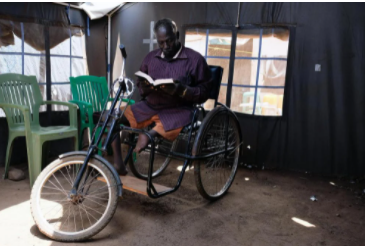The union of persons with disabilities (PWDs) in Eastern Equatoria State on Monday voiced their concern over the lack of representation in Non-Governmental Organizations (NGOs).
The concerns were raised during a roundtable discussion on challenges facing PWDs in the state where they commended the government for inclusiveness but faulted the private sector and NGOs for not employing people living with disabilities.
The chairperson of the Union of PWDs in the state, Pastor William British Noel, said they are not being given chances and are not encouraged to apply whenever there are job opportunities in NGOs.
“In offices, they do not give us chances so that we can work, especially in NGOs, when they are advertising, they don’t encourage the disabled to apply. They only put (employ) those who are able,” Pastor Noel said. “We also find challenges when we go to offices, there are some places that the disabled cannot get to. When they go, they will remain on the ground floor and the issue he or she wanted to share may not be heard. Even in our families, when a disabled person is born, they even want to kill him or her or else they just leave them without care.”
Susan Ifuho, who is visually impaired said despite their disabilities, they can still perform numerous activities and jobs like other abled persons.
“I the person who is disabled can do something to help Eastern Equatoria or South Sudan but there is no support. We need support from our government so that we work together. There is nothing impossible for us. If I cannot use my eyes, I can use my hand, mouth, and leg to help South Sudan. We need to work together,” Ifuho implored.
A student at Torit Health Science Institute, Kamilo Okito Moses, says there is so much injustice at workplaces as those who are disabled are not granted equal opportunities despite having academic papers and other qualifications.
“Disability is not inability but in life, there are so many things which are not bringing people to mean what they are saying. I can finish my studies but my diploma or degree might be useless because there is no equal opportunity given to people,” Okito lamented. “We can compete with those who are abled in education, in everything, but the worry is when we finish, that discrimination is there.”
Assai Peter Lodihoriok, another member of the PWD union said even outfits meant to deal with their issues are staffed with abled people in the state.
“Let me go particularly to NGOs, an NGO can make a project under PWDs but when you go there, you get around 90 percent of the staff are able people. Are these people living with a disability? Up to now, we are still doubting whether we are equal or not. We are not equal.” Lodihoriok said.
Responding to the PWDs' grievances, the inspector of labor in the state’s ministry of labor, public service, and human resource development, Lino Mark, said the people living with disabilities are reflected in the government system, ensuring their full inclusion.
“As per what we heard from them (PWDs), for sure with us the Government, they are reflected and they are there in the system. The majority of PWDs are with us even in my directorate, the Directorate of Labour,” Mark said. “So, with us the government, we reflect them, they are there in the system. When we come to NGOs, so many NGOs get funds to support PWDs but when we come on the ground when they are given funds, we don’t see inclusiveness of PWDs, it is not there.”




